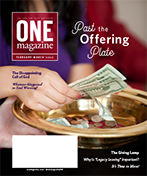
February -
March 2022
Stewardship: Past the Offering Plate
------------------
|





Whatever Happened to Soul Winning?
By Robert E. Picirilli
One of the nice things about living to a ripe old age is you see many things come and go. However, one thing I miss in today’s church life is soul winning. What happened to it?
I came of age in the middle of the last century and was a student at Free Will Baptist Bible College (now Welch) from 1949 to 1953. That was a transitional time, not only for me but also for the entire denomination. The College, founded in 1942, was beginning to influence Free Will Baptists in several ways, including leadership, concept of ministry, understanding of the Christian life, and even—to some extent—theology.
One of those areas was soul winning. I had never heard the word, much less what it represented, before I stepped on the campus in September 1949. Oh, I had experienced some inner promptings on my own. I remember a revival meeting at my home church, Mt. Elon, in Florence County, South Carolina, when I was 14 or 15. Fall revivals were times for “getting saved.” As far as I knew at the time, you could only “get saved” during revival meeting. (And truthfully, I “got saved” at more than one of them!) The time I’m remembering, I was already saved. I had a friend who wasn’t, and during the invitation one night, I went to him and put my arm around him. “What?” he whispered. I didn’t know what to say. But he went forward.
That was all I knew about soul winning. But on my first day on campus, even before registration, a bunch of returning fellows said, “Let’s go have a street meeting.” I had no idea such a thing existed, but I went along and was baptized into street evangelism. As the year progressed, I was assigned to first one and then another “practical work group.” Everybody understood the underlying purpose of all the groups was to identify somebody for a personal witness.
We had no choice but to take a semester of personal evangelism, using William Evans’s book Personal Soul Winning. We learned to present the gospel in one-on-one encounters, how to answer objections, and how to seek a decision. We learned that one needs to exercise tact, but not to be so tactful there is no contact. Brother J. P. Barrow, the teacher of that course, required us to memorize roughly 100 Bible verses we could use. We had no uncertainty about what all of this was for. It was for soul winning.
One of the verses we memorized was Proverbs 11:30: “The fruit of the righteous is a tree of life; and he that winneth souls is wise.” Another verse was Daniel 12:3: “And they that be wise shall shine as the brightness of the firmament: and they that turn many to righteousness as the stars for ever and ever.”
We quickly formed the notion that personal soul winning was our responsibility, ranking right up there with daily Bible reading and prayer in terms of what it means to live a dedicated Christian life. Soul winning was for every Christian, male or female, and it didn’t matter whether you were called to preach or not.
Speakers invited to the college hammered this truth home: we ought to be out soul winning. One would share that he had covenanted with the Lord to witness to somebody every day. Another described different methods to start the conversation. We had demonstrations of how to present the gospel, with one acting out the part of the sinner and another the part of the witness. The faculty participated, often accompanying us on practical work assignments and taking part in distributing tracts or dealing with an inquirer. I well remember J.P. Barrow and Charles Thigpen with us at times. I also remember LaVerne Miley heading off by himself with a pocketful of tracts to find somebody with whom he could share the gospel.
Our consciences bothered us if we weren’t making efforts to win souls. I still remember a city bus ride back to campus with my girlfriend after a church service. A teenaged boy sat across and back a few seats. I felt I should witness to him and didn’t. My girl asked me what was wrong, and I was almost in tears because of my failure of nerve. (Or maybe I just didn’t want to leave her!)
When I began graduate school at Bob Jones University, the emphasis on soul winning continued there and perhaps increased. Even graduate ministerial students were required to take a Tuesday-Thursday morning course, every semester, that everybody called “Preacher Boys.” Every class opened with the class singing a song that somebody at Bob Jones had written:
“Souls for Jesus” is our battle cry.
“Souls for Jesus”—we’ll fight until we die.
We never will give in while souls are lost in sin.
“Souls for Jesus” is our battle cry.
Singing those words twice a week for several years makes an impression. That impression was reinforced by speaker after speaker, challenging us preacher boys to win souls. One of the requirements of the course was to write up accounts of our efforts to win somebody to Jesus. I can still remember a time or two, when the reports were due and I had not met the required number, going downtown to find someone to talk to about becoming a Christian. You didn’t necessarily have to succeed, but you had to try.
When I returned to the College in 1955 to teach, that was still the culture among us, at least among the newer preachers and leaders who had gone to the Bible College or were influenced by those who had. When I became interim pastor at Cofer’s Chapel in 1962, I decided to get things started and inaugurated a “Visitation Corps,” borrowing from the new “Peace Corps” plan of John F. Kennedy.
When Eugene Waddell became pastor, he began a regular Thursday evening visitation, and I was happy to be among those who went every week to try to win someone to the Lord and bring them to church. Brother Waddell also started a bus ministry that systematically combed the streets and brought children to church. Those on visitation followed up by witnessing to their parents. Some people in our North Nashville community made it a point to be away from home on Thursday nights to avoid us!
I had been indelibly marked by an obligation, one I have never escaped, even though I’ve often failed to meet the obligation. And I was by no means the only one. Soul winning was, indeed, a culture among Free Will Baptists. What happened to it?
Sure, I know not everything about that period was ideal. There were abuses, to be sure: silly things like climbing church steeples or swallowing live goldfish to entice crowds. Did we think, as we rid ourselves of those abuses, that we had to do away with the soul winning, too? Did we think the idea of soul winning was responsible for The Gospel Blimp? Or did we, to use an old saying, “throw out the baby with the bath water”?
I remember some saying “soul winning” wasn’t a good biblical term, that it should be changed to witnessing. Was this an underhanded way not just to lose a word but to lose an uncomfortable responsibility?
Somebody else said we had exalted soul winners to the status of “high priests” among us, and we ought not do that. Soul winning was not for everybody, they said, but that it was a gift for a few (evangelists in Ephesians 4:11). They were quick to point out that this gift made them no better than anyone else in the church. I’ll agree some believers are gifted to win people to Jesus better than others, and this doesn’t make them superior to other believers. But does that awareness lead to canceling out soul winning as a Christian responsibility? Scripture describes the gifts of giving and of showing mercy, too (Romans 12:8), but all believers share these obligations.
These days, many say only “relationship evangelism” works. Does that do away with soul winning? I challenge folks who believe in relationship evangelism: how many relationships with the unconverted are you actively cultivating? And how long does it take before you work your way around to sharing your faith?
I know the usual response to these questions is, “Society has changed,” or “You can’t do that sort of thing now.” Is anybody trying? Or did we just quit because somebody told us soul winning doesn’t work anymore? I fear we have given up entirely.
Of course, I know society has changed. For one thing, everybody is “saved” to hear them talk (or to hear preachers doing their funerals). It hasn’t been long since I tried knocking on doors, by myself, in the community around our church, on Saturday afternoons. All of those I met professed to be Christians and to have some sort of tie to a church they rarely attend. Jesus Himself said those who aren’t sick (by their own measure) have no use for a physician. It didn’t take me long to give up that approach.
I also admit I no longer visit someone at night without first making an appointment. People don’t even come to the door anymore. I understand that. Often, they live in apartment buildings and gated communities closed to random visits. Sure, these problems exist.

As a result, for one reason or another, we’ve given up on soul winning. Perhaps it’s because we didn’t really want to do it anyway; it’s too uncomfortable. Perhaps it’s because we got discouraged when the old methods no longer worked, and we were unwilling to find new ways. Perhaps we thought we could escape the responsibility by giving to other organizations working directly with lost people. That’s always an easy way out.
I remember when Billy Morris, a college-mate and friend (now deceased), told on himself. He pastored a church in Durham, North Carolina, that had experienced a long, dry spell. He attended a soul winning conference and was challenged. Over the next three months, he personally won six young couples to Christ and to active membership in the church. What made the difference? He worked at winning people to Christ.
I don’t have all the answers and perhaps not any answers. But this old geezer would like to start a discussion. Whatever happened to soul winning? If that very question makes you cringe, put it another way: whatever happened to focusing on sharing the gospel with the unconverted and appealing to them to accept the saving work of Christ? If the old methods won’t work, whatever happened to figuring out new ways we can reach the lost?
About the Author: Dr. Robert E. Picirilli is an author, retired college professor, and Free Will Baptist historian. He completed degrees at Welch College (B.A.) and Bob Jones University (M.A., Ph.D.), and spent his career teaching and in academic administration at Welch, specializing in the Greek New Testament. He has authored or co-authored numerous books. Dr. Picirilli lives in Mt. Juliet, Tennessee.
|
|

